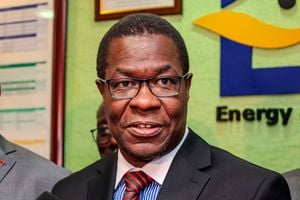
As eight Cabinet Secretaries grapple with their respective crises, from nationwide power outages and university funding reforms to teacher strikes and Mpox concerns, the pressure is mounting for them to stabilize their portfolios.
At least eight Cabinet Secretaries are battling major crises in their ministries even before settling down. From nationwide power outages, the Mpox scare, university funding model to the recent teachers’ strike, threats by county workers as well as protests over plans to reintroduce tax measures in the withdrawn Finance Bill, 2024, the CSs have been on their toes amid high expectations to deliver.
Mr Opiyo Wandayi (Energy), Dr Alfred Mutua (Labour), Mr Justin Muturi (Public Service), Mr Julius Migos Ogamba (Education), Mr Davis Chirchir (Roads and Transport), Dr Debra Barasa (Health) and Mr John Mbadi (Treasury) face challenges barely a month after taking over.
With schools reopening for the third term and dates for the Kenya Certificate of Primary Education and Kenya Certificate of Secondary Education tests approaching, Mr Ogamba has had a rough time.
Though he was relieved when the Kenya National Union of Teachers (Knut) called off its strike, the CS still had to deal with the work boycott called by secondary school teachers.
Mr Ogamba has been missing in action on critical matters, including skipping a town hall meeting presided over by President William Ruto to discuss the new university education funding plan.
His ministry is on the radar following the deadly Hillside Endarasha Academy fire on Friday morning.
Mr Wandayi had hardly celebrated his when the country was plunged into darkness. Dr Ruto was at Mr Wandayi’s event.

Power outage in Mombasa.
During his days as Leader of Minority in the National Assembly, Mr Wandayi never spared the government whenever the country experienced blackouts.
“Frequent nationwide power outages not only expose KPLC incompetence but also compromise national security while denting economic production,” Mr Wandayi said last year.
The country faced yet another blackout on Friday. At a press briefing, the Cabinet Secretary blamed the blackout on a technical hitch.
He said the Friday power blackout was caused by a partial collapse of the national grid.
There was no mention of incompetence and calling of rolling of heads as he used to say while in the opposition.
The Friday blackout happened a day after Mr Wandayi met Kenya Power managers and demanded a report “within a month” on the technical, operational and protection of the power system.
As Mr Muturi took office, he found a strike notice by the Union of Kenya Civil Servants on his desk. With the government facing an impending strike by secondary school teachers and university dons, he could not afford another work boycott.
He held a meeting with the union Secretary General Tom Odege. During the meeting, the CS told the union that he would ensure the pay deal is implemented, promising to consult the National Treasury.
A second meeting with Mr Odege saw the union call off the planned strike.
“One needs all hands on deck and consult widely,” Mr Muturi said, adding that ministries would hire qualified and certified HR managers to help address emerging issues at the workplace.
Dr Mutua has found himself in the middle of the controversial leasing of Jomo Kenyatta International Airport to an Indian firm.
Though the matter is under the Transport CS, Dr Mutua on Wednesday met the Kenya Airport Workers Union (Kawu), which is opposed to the deal.
In the proposed deal, Adani seeks to run JKIA for 30 years. The deal includes changing aviation laws and policies to limit competition and maximise profits.
Dr Mutua promised to furnish union officials with a copy of the agreement.
“I believe in efficient and speedy handling of issues. In addition to meeting Knut and the Kenya Union of Post-Primany Education Teachers (Kuppet) and dealing with issues brought up by Kawu, I have met players in the employment recruitment agencies and extinguished many fires,” he said.
Things are not looking up for Dr Barasa. Medical workers issued a joint statement on Thursday, September 5, saying they may call a general strike if devolved governments fail to tackle their grievances, including salary delays, lack of medical cover and failure to remit statutory deductions.
The increasing number of Mpox cases is also an issue of concern. Though the World Health Organisation (WHO) recommends vaccination for anyone who has had contact with an infected person, Kenya has no Mpox vaccines.
Mr Chirchir has to look for a way of settling pending bills at the ministry, which his predecessor Kipchumba Murkomen, said stood at Sh700 billion in June.
Mr Murkomen, now Sports Cabinet Secretary, said it would take about 15 years to complete road projects the government has committed to do due to limited allocations.
Mr Chirchir is also under pressure to come clean on the Adani-JKIA deal.
The increasing number of road accidents is also a matter of concern among Kenyans.
Mr Mbadi has the task of coming up with new revenue-raising measures.
He has to execute the measures without inviting the wrath of the Gen Z. The young Kenyans held sustained protests that led to the rejection of the Finance Bill, 2024, creating a Sh346 billion hole in the national budget.

Treasury CS John Mbadi.
During his vetting, Mr Mbadi said he would bring back non-contested areas in the rejected Bill.
Last month, Mr Mbadi met IMF representative Selim Cakir, a meeting that attracted sharp reactions. Kenyans online told Mr Mbadi “not to fall to IMF tricks”.
He dismissed reports of IMF putting conditions on the government, adding that no loan was discussed.
“We just had a general discussion about the coming board meeting in September. You remember the meeting was to take place in July,” Mr Mbadi said.
The IMF Executive Board was expected to meet in July to approve a funding drawdown for Kenya.
Due to the anti-government protests and the withdrawal of the Finance Bill, 2024, the meeting failed to take place.









